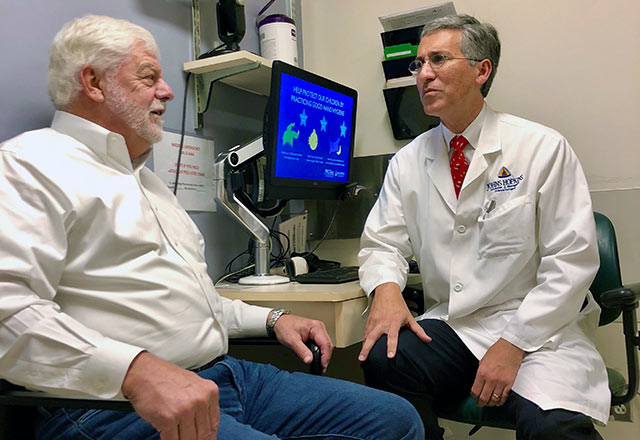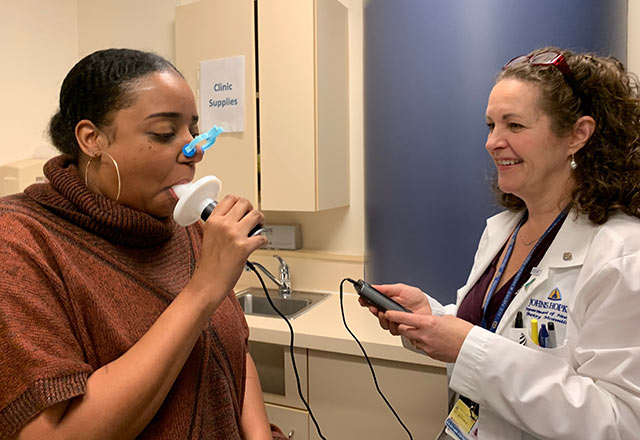Open ALS Clinical Trials
Our program offers patients two types of clinical trials: ones that explore new ways to treat ALS, and ones that aim to learn more about the disease. Both types of studies are equally important to our mission to ultimately uncover pathways to prevent ALS in the first place.

Therapeutic studies for ALS
Bringing treatment to ALS patients is the main mission of this program’s efforts. Our goal is to enroll all potential ALS patients into clinical trials that could help slow, halt, and eventually improve ALS. These therapies can take the form of traditional medications taken in pill form or by injection, but have also included gene therapy studies and the study of medical devices.
COMBAT
A Phase 2b/3, Multi-Center, Randomized, Double-Blind, Placebo-Controlled, 12 Month Clinical Trial to Evaluate the Efficacy and Safety of MN-166 (Ibudilast) followed by an Open-Label Extension Phase in Subjects with Amyotrophic Lateral Sclerosis
Status: Active, Enrolling
Route of Administration: Oral
Length of Study: ~13 Months + ~6 Months Optional Open Label Extension
Principal Investigator: Nicholas J. Maragakis, M.D.
Contact: Betsy Mosmiller (emosmil1@jhmi.edu)
More information on clinicaltrials.gov: NCT04057898
Ibudilast is being investigated as a potential new therapy to slow the progression of ALS. Ibudilast is thought to have neuroprotective effects by working against nervous system inflammation. Ibudilast is a capsule, taken orally with a 1:1 ratio of study drug to placebo. This study has a 12-month double-blind phase, followed by a 6-month open label extension period. Patients who enroll in this study must also be taking the approved ALS drug Riluzole (Rilutek®). Patients already taking the approved ALS drug Edaravone/Radicava® are eligible for this study.
Ibudilast (developed by MediciNova) acts as a nonselective phosphodiesterase inhibitor and has been used as an anti-asthmatic medication, as it reduces release of leukotrienes, cytokines and other molecules involved in bronchospasm. It also modulates survival and activation of immune cells in the CNS by preventing the production of pro-inflammatory agents from microglia. It also modulates release of migration inhibitory factor (MIF).
CortiCom
Brain-Computer Interface (BCI) Implant for Severe Communication Disability
Status: Active, Enrolling
Route of Administration: Implanted Device
Length of Study: ~6 months
Principal Investigator: Nathan Crone, M.D.
Contact: 410-955-6772 or ncrone@jhmi.edu
More information on clinicaltrials.gov: NCT03567213
A BCI allows individuals to operate a computer with their mind alone. Small electrodes on the surface of the brain carry signals to the computer, letting patients more easily communicate with family and friends.
For patients with significant motor impairment, a BCI system can potentially provide greater independence and quality of life. The study involves surgical implantation of electrodes on the surface of the sensory motor cortex involved in speech and upper limbs.
After surgery, participants will learn how to operate the BCI by traveling to the study site three times a week.
ATLAS
A Phase 3 Randomized, Placebo-Controlled Trial With a Longitudinal Natural History Run-In and Open-Label Extension to Evaluate BIIB067 Initiated in Clinically Pre-symptomatic Adults With a Confirmed Superoxide Dismutase 1 Mutation
Status: Active, Enrolling
Route of Administration: Intrathecal (Lumbar Puncture)
Length of Study: Up to 2 years (Varies with Regime)
Principal Investigator: Nicholas J. Maragakis, M.D.
Contact: Betsy Mosmiller (emosmil1@jhmi.edu)
More information on clinicaltrials.gov: NCT04856982
Tofersen (also called BIIB067) is currently being evaluated in adults for the treatment of ALS associated with a mutation in the SOD1 gene. The optimal timing for initiation (i.e., prior to or after the emergence of clinically manifested disease) of tofersen is unknown. Other neurodegenerative diseases, such as Alzheimer’s disease and Parkinson’s disease, are understood to have pre-symptomatic phases in which there may be abnormalities detected by biomarkers, without overt clinical signs or symptoms, but more research is required to determine and characterize the pre-symptomatic phase in ALS. This study will evaluate the impact of initiating tofersen based on biomarker evidence of disease activity, prior to the emergence of clinical symptoms or signs that definitively indicate ALS. It is hypothesized that initiation of tofersen in presymptomatic SOD1 carriers will delay the emergence of clinically manifested ALS, and/or slow the decline in function once symptoms are observed compared to the initiation of tofersen at the time of, or after, emergence of clinically manifested ALS.
FUSION
A Phase 1-3 Study to Evaluate the Efficacy, Safety, Pharmacokinetics and Pharmacodynamics of Intrathecally Administered ION363 in Amyotrophic Lateral Sclerosis Patients With Fused in Sarcoma Mutations (FUS-ALS)
Status: Active, Enrolling
Route of Administration: Intrathecal
Length of Study : Part 1~ 8 months, Part 2~ 2 years and 3 months
Principal Investigator: Jeffrey Rothstein, M.D., Ph.D.
Contact: Betsy Mosmiller (emosmil1@jhmi.edu)
More information on clinicaltrials.gov: NCT04768972
The primary purpose of this study is to evaluate the clinical efficacy of ION363 on clinical function and survival in carriers of fused in sarcoma mutations with amyotrophic lateral sclerosis (FUS-ALS). This is a multi-center, three-part study of ION363 in up to 77 participants. Part 1 will consist of participants that will be randomized in a 2:1 ratio to receive a multi-dose regimen of ION363 or placebo , followed by Part 2, in which all participants will receive ION363.
Due to the mechanism of action of ION363, only individuals with a confirmed pathogenic mutation of the FUS gene are eligible. Individuals possessing a variant of uncertain significance may be considered at the Sponsor’s discretion.

ALS Biomarker Studies
Our greatest limitation to treating Amyotrophic Lateral Sclerosis (ALS) is the lack of understanding what causes or enables sporadic ALS. However, Johns Hopkins researchers are uncovering powerful discoveries for this progressive disease. These discoveries start in research laboratories across the institution as well as collaborations with investigators across the globe.
